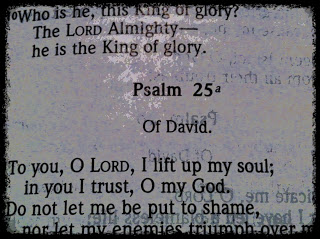Here is today’s passage in the Psalm 25 series (v. 15):
My eyes are ever on the Lord,for only he will release my feet from the snare.
In times of trials or problems, what do you tend to look at? On what do you focus?
This is easy for me to answer. I tend to focus on my problems. In the past, this was my typical pattern:
First, I would stare at the trap or potential trap.
Second, I would try to think up a solution I could do myself.
Third, I may begin to think about how the God of the impossible could probably help me out with this situation.
Fourth, I generally end up talking myself out of God being able to really do anything because isn’t this problem just too big for God?
When I say it out loud, it sounds ridiculous, doesn’t it?
But this is what we do all the time.
Today at church, my pastor said, “What is impossible for God?”
And all of us good Christians answered, “Nothing.”
If only we acted as if we truly believed this.
We say it, but we don’t live and act as if we believe it.
We limit God.
As I read this passage a few months ago, I realized how often I fix my eyes on the snare. I analyze it. I imagine all possible outcomes and how I can avoid it or fix it. I lament at the difficulty of the situation.
And often I end up expending so much emotional energy evaluating the snare that I practically fall into it.
“My eyes are ever on the Lord….”
What would happen if we instead fixed our eyes on the One who is able to release us from the snare?
God does not tell us to evaluate the snare. God calls us to look on Him. I’ve included some past blog posts at the end to encourage you in looking to God.
Pray this with me:
Lord God, forgive me for trying to fix things all the time, as if that is within my power. You call me friend, and yet I am slow to ask for help. Your Word says, “You have not because you ask not,” and so, I ask. Help, Lord. May my eyes ever be on You, the Rescuer, and not on the snare. I pray this in the mighty, powerful name of Jesus. Amen.
Several blog posts that might be helpful:
Seeing with God’s Eyes
Look Beyond Your Mountains
Watch for God





